Indeed, if you don't want to you can make the choice for yourself!
Thursday, December 14, 2006
Tuesday, November 07, 2006
The timing is also most interesting. SCO's case is nearing its end and the Oracle Linux release just happened. I wonder what IBM is thinking now as they are the one that pushed Novell into buying Suse and Ximian. And why has there not been any reaction or opinion on the deal from them?
Monday, November 06, 2006
At this point in time it is a Red Hat rip-off, plain and simple. Hell it barely makes sense to have this product around in it's current form. What is Oracle trying to prove or achieve with this?
They certainly have no Linux reputation, other then releasing their main product (database) for it. The possibility that they provide better support then RH seems questionable to say the least. It is after all just a copy, so why not get support from the creators directly? Lastly, If you are concerned about the costs and do not really want support you just might as well install CentOS and if really needed, get cheaper support from your local Linux vendor.
No, what I would have expected, and what I hope this Oracle Linux will grow to is a lean, mean, data munching, IO crunching database version. Designed and tuned by Oracle to run their ruling database on it, and nothing else. Just like VMware uses Linux in some products.
Tuesday, October 31, 2006
Friday, October 20, 2006
Sunday, October 15, 2006
Saturday, October 07, 2006
Ever since I've been into computers and read magazines like ACE, which were very much into the subject, I thought it to be cool and the future of gaming. This was later confirmed after I had the chance to play 2 VR games. The graphics were not that hot, and you had to wear a clumsy helmet, but the immersion into the game was the best you'd ever experience.
All consoles have great gfx already, but only few games really manage to really put you into the game. By creating a controller that can mimic anything you can hold in your hands you really get a very big step closer to true VR. Playing tennis, or any of the other sport games are just the beginning. Where the VR sets of 15 years ago would fail was the helmet part. Nobody wanted to wear those things back then and probably nobody would want to wear then today. However the helmets were used to track your movements and these movements are now captured by the nunchuk part of the controller.
Just read this preview, it contains the following about the wii;
"Yes, it might have GameCube quality graphics, but it adds boatloads of a much more important element: fun. All of the hand swinging and gesturing really immerses you in the game."
Wednesday, March 29, 2006
Thursday, March 23, 2006
 We all know the problem about proprietary software is lock-in danger. How can you ever be sure, that whenever you would like to move away from a certain type of software, you are able to do so. What guarantee is there that the data managed by these softwares is yours and not owned by that application.
We all know the problem about proprietary software is lock-in danger. How can you ever be sure, that whenever you would like to move away from a certain type of software, you are able to do so. What guarantee is there that the data managed by these softwares is yours and not owned by that application.
A new initiative, called Certified Open, will allow companies to rate their products in terms of openness. Giving you some kind of confidence in that it at least complies with certain standards. It appears there are 3 different levels; bronze, silver and gold, though I could not find any reference to what it entails.
Wednesday, March 22, 2006
Saturday, March 11, 2006
Thursday, March 09, 2006
Sunday, March 05, 2006
HP is dropping PA-RISC support in favor of Itanium, so it would be a good idea to bring HPUX to Proliant servers according to McNealy. The only people interested in this are the ones where HP is not interested in. HP is quite happy to have their top of the line servers running on proprietary processors. HPUX and the servers it runs on are an excellent excuse to charge immensely large amounts of money on hardware, software and services. The hardware is not at all that hot (although it very well made and still contains nice features, but nothing much has changed for years), the software is crap, most to blame is HPUX itself, but almost all HP implemented software has this over-complex-bloated-bug-ridden status upon it (compared to Solaris or Linux, which most of time still follow the KISS principle).
No really, if HP would want to go to the Proliant platform, they'd do better to drop HPUX and go Linux. No reason why they wouldn't be able to make great Linux specific servers with quality support. Ofcourse, that would make them just another Linux vendor, but now they are just another Unix vendor with an outdated product in their hands.
Wednesday, March 01, 2006
The second bit is about Microsoft thinking it Will beat Google in 6 months. Again, this isn't the first time we hear them say this, so far nothing has changed. MS Search still returns 'How to Remove Linux and Install Windows on Your Computer' when searching for 'linux' and it will return 'Programming with Circles, Triangles and Rectangles' for keyword 'xen' (the actual Xen site is not even listed on the first page of results). All the while Google returns sensible results.
Tuesday, February 28, 2006
first up was Greg Stein, working for Google on the excellent subversion. Which is a better CVS, because they based it upon it. The reason for this is simple, the program is so immensely popular. The main advantages of svn are; a better use of resources, good binary handling, use of revision numbers instead of dates and maintenance of branches. In the future Greg would like to add merge support and a database back-end.
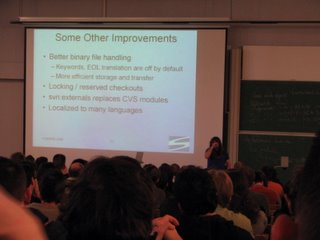
Next up was Julian Seward with his little talk on valgrind, an excellent memory usage profiler. It will analyze any program, even closed source ones, on their memory (mis)use. Valgrind is the name of a suite containing many tools like memcheck and cachegrind. You can use it to detect many memory mishaps like; memory leaks, cache hit fails and bad references. Julian suggest running valgrind on any program you write by default. It will detect a lot of bugs you never though of and will make your program more stable after fixing those bugs. Some people I was sitting next to questioned the difference between valgrind and dtrace. The first is a reporting tool on program memory usage while the second provides you with an interactive system querying tool. Both powerful tools in their own right.
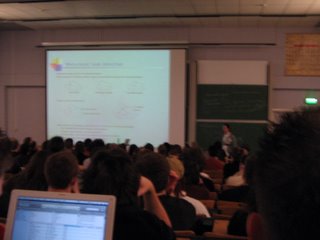
The afternoon started of with Jon Trowbridge (which is now working for, surprise, Google) on Beagle. Jon is no longer working on this project so he considered this his farewell speech. Beagle started as a back-end for the dashboard project. dashboard was very hard to make work correctly because it was missing this back-end infrastructure, beagle was supposed to be just that. At the moment there is no active development on dashboard. Beagle contains an easy to devel for plugin interface, so everybody can extend it to include any program/data. The most difficult part is getting data out of programs. Each program is pretty good at managing its own data, but does not report anything about it. Evolution is a prime example, it is very hard to get evolution to report the data it maintains, but it is also hard to tell it to show certain data if you know what you want. Things you have to keep in mind when writing search aware applications. Jon did confess that beagle was not developed with multi user machines in mind.
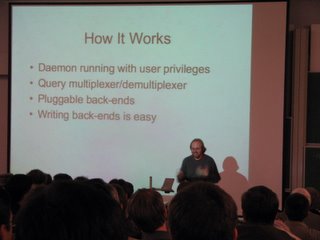
Micheal Meeks is a very energetic speaker, last time I saw him at fosdem he was still working for Ximian, now he's a Novell employee. He's hacking away at OO.o, an important project because it is so visible and everybody uses it. It is an important revenue source for MS, and accounts for 75% of the software costs of a new PC. The spreadsheet appears to be the most important part of the suite and yet this has a small team of developers (while MS has many). Some improvements where made in speed, using valgrind, and VBA macros support is available (only 20% of the language is covered, but it turns out to be enough to get most things working).

The final fosdem talk was given by Jeff Waugh, he talked about the Linux desktop and the challenges it holds. He started of showing the differences between Gnome 1.x and the current version. This really showed how insane some of the earlier options were, much up to the point of being plain silly. Now Gnome tries to do the right thing most of the time, while still allowing you to change the options you could care about. The same is true for dialog boxes, these can be interpreted now most of the time by just reading the button text instead of the while dialog text. The talk slowly transformed in why and how to get people over to a free/open desktop. We have to offer a package, which is compelling enough to switch. One single application never makes people switch, rather a framework does. Examples of this are; LAMP and iPod>iTunes>ITMS. The 'gratis' part is important as well. Ubuntu tries to do these by never charging for their distro and providing a framework like launchpad.
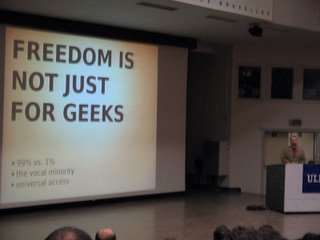
Some random pictures of the event to end my report. As a bonus you can try to find the hidden Chipzz!



Saturday, February 25, 2006
First talk I went to was the DTrace developers presentation by Jon Haslam. Never had the time/chance yet to play around with DTrace before, but after this talk I'm sure to install OpenSolaris in a VM and try to build some scripts. It's a nice tool, and can be used for many purposes, not just performance but debugging as well. The nice thing is that you can get results very fast with small scripts. Even if you have no idea where to start it's easy to start with a top overview and start drilling down. Jon demonstrated this by creating a script that showed a lot of polling events, after digging deeper and deeper by extending the script each time a little bit, we got to the X.org server doing mouse polling.

Next up was an OpenSUSE power management talk. Important for laptop users, and the environment in general. The guys hooked up a laptop to a power meter and dropped the power usage from 28Watt/14Ampere to 15Watt/7.5Ampere. The important thing about this speech was that results differ from laptop to laptop. Some of them don't benefit at all, it all depends on the 'intelligence' of the driver. They did not yet have a list with all their test results online, but they were thinking about it.
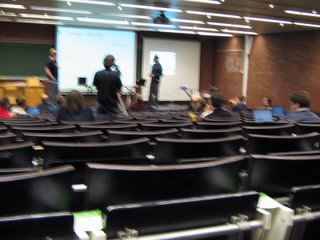
Last was XEN by Ian Pratt, the famous virtualization software. Good talk once again, nice to see how far and advanced XEN has become. All the features are there to make this the virtualizer by choice on OSS operating systems. On the roadmap area; support for NUMA machines and other performance fixes, more hardware support and better tools. XEN is also available on PPC machines and IA64, although not all features are support on all CPU's. The ultimate goal of the project is to have a machine boot XEN by default, so whenever you would need it, it's there available for you. This is possible because running linux native or in XEN introduces almost no performance impact.
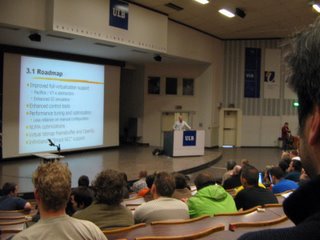
Also, we got RMSposing for the camera and some other picture to capture the atmosphere of the first day of the event.
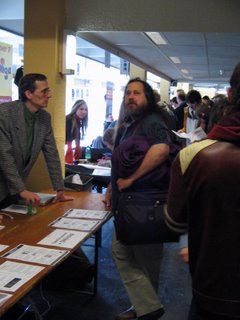
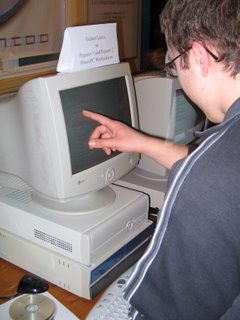
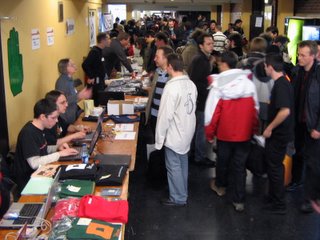
Wednesday, February 22, 2006
Saturday, February 18, 2006
Second price goes to Pydev, which is recommended for Eclipse users.
Sunday, February 12, 2006
The only site, I know of, that has a similar concept is Kernel Trap, if anybody knows any others, leave a comment please.
Thursday, February 09, 2006
All in all, I don't think it is a bad idea. In fact Ubuntu-Mepis could replace Kubuntu which is really not that good, meaning that Mepis has more or less comparable philosophies as Ubuntu.
Sunday, February 05, 2006
It simply is not a false sense of security. I turned my wife's PC to Linux and i'm never bothered with these things. But every month a windows PC returns to me, ready for reinstall. Despite all security measures against any type of ware it still fails.
Saturday, February 04, 2006
Friday, February 03, 2006
If they do it, it will be a good move as a lot of companies/people will (continue to) use it and if they will provide paid support for the product it could turn out to be a pretty good revenue source.

.jpg)
